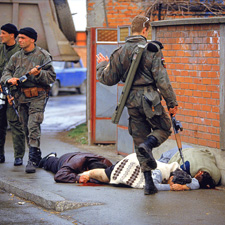
The ICTY has jurisdiction over individual persons and not organisations, political parties, army units, administrative entities or other legal subjects.
The mandate of the Tribunal is to bring to justice those responsible for serious violations of international humanitarian law committed in the former Yugoslavia since 1991 and thus contribute to the restoration and maintenance of peace in the region.
In accordance with its Statute, the ICTY has jurisdiction over the territory of the former Yugoslavia from 1991 onwards. It has jurisdiction over individual persons and not organisations, political parties, army units, administrative entities or other legal subjects.
Although the ICTY and national courts have concurrent jurisdiction over serious violations of international humanitarian law committed in the former Yugoslavia, the ICTY can claim primacy and may take over national investigations and proceedings at any stage if this proves to be in the interest of international justice. It can also refer its cases to competent national authorities in the former Yugoslavia.
The Tribunal has authority to prosecute and try individuals on four categories of offences: grave breaches of the 1949 Geneva conventions, violations of the laws or customs of war, genocide and crimes against humanity. The ICTY has no authority to prosecute states for aggression or crimes against peace; these crimes are within the jurisdiction of The International Court of Justice.
Pursuant to Article 1 of the ICTY Statute, the Tribunal has jurisdiction over persons responsible for serious violations of international humanitarian law committed in the territory of the former Yugoslavia since 1991. The ICTY Statute also states that the official position of an accused, whether as Head of State or Government or as a responsible Government official, does not relieve him of criminal responsibility nor mitigate punishment.
Articles 2 to 5 of the Statute identify four different categories of crimes, as described below, for which the Tribunal has jurisdiction. Importantly, Article 7 provides that a person who planned, instigated, ordered, committed or otherwise aided and abetted in the planning, preparation or execution of a crime referred to in Articles 2 to 5 shall be individually responsible for the crime.
Grave Breaches of the Geneva Conventions of 1949
The four Geneva Conventions set forth rules for the wartime protection of civilians, who do not take part in the fighting, and sick, wounded or shipwrecked members of armed forces and prisoners of war, who can no longer fight.
Currently there are 194 States that are parties to the Geneva Conventions. These States Parties are required to enact any legislation necessary to provide effective penal sanctions for persons committing or ordering to be committed "grave breaches", of the Geneva Conventions. They are also obliged to search for persons alleged to have committed, or to have ordered to be committed, such breaches and bring them before their courts or hand them over to another State for trial. Pursuant to Article 2 of the ICTY Statute, the Tribunal has jurisdiction over these grave breaches:
"The International Tribunal shall have the power to prosecute persons committing or ordering to be committed grave breaches of the Geneva Conventions of 12 August 1949, namely the following acts against persons or property protected under the provisions of the relevant Geneva Convention:
- wilful killing;
- torture or inhuman treatment, including biological experiments;
- wilfully causing great suffering or serious injury to body or health;
- extensive destruction and appropriation of property, not justified by military necessity and carried out unlawfully and wantonly;
- compelling a prisoner of war or a civilian to serve in the forces of a hostile power;
- wilfully depriving a prisoner of war or a civilian of the rights of fair and regular trial;
- unlawful deportation or transfer or unlawful confinement of a civilian;
- taking civilians as hostages."
Violations of the laws or customs of war
The laws or customs of war regulate the conduct of armed conflict, including towards civilians. Article 3 of the ICTY Statute sets out a non-exhaustive list of violations punishable under its jurisdiction. The list includes, for example, the employment of poisonous weapons, wanton destruction of cities not justified by military necessity, destruction of institutions dedicated to religion and plunder of public or private property.
The laws or customs of war are a body of international law introduced through various international treaties, conventions and agreements, most notably the Hague Conventions of 1899 and 1907 and the Geneva Conventions of 1949 and Additional Protocols of 1977, as well as through the development of customary international law.
Crimes against humanity
The notion of crimes against humanity has evolved over many decades and they were included in the Charters of the Nuremberg and Tokyo Tribunals which conducted trials in the aftermath of World War II. Article 5 of the ICTY Statute defines them as "the following crimes when committed in armed conflict, whether international or internal in character, and directed against any civilian population:
- murder;
- extermination;
- enslavement;
- deportation;
- imprisonment;
- torture;
- rape;
- persecutions on political, racial and religious grounds;
- other inhumane acts."
Genocide
Article 4 of the ICTY Statute incorporates Articles 2 and 3 of the 1948 Convention on the Prevention and Punishment of the Crime of Genocide. Article 4 lists acts which constitute genocide, if committed "with intent to destroy, in whole or in part, a national, ethnical, racial or religious group, as such". These acts include killing members of the group and causing serious bodily or mental harm to members of the group.
In addition to genocide, conspiracy to commit genocide, direct and public incitement to commit genocide, attempt to commit genocide and complicity in genocide are also punishable under Article 4.

